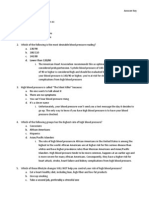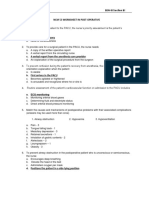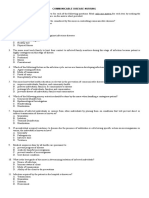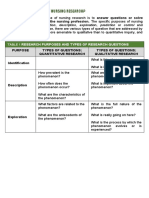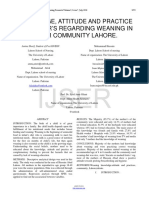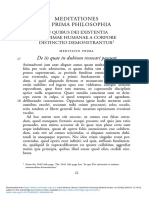Ethics in Healthcare Case Scenarios
Ethics in Healthcare Case Scenarios
Uploaded by
A CCopyright:
Available Formats
Ethics in Healthcare Case Scenarios
Ethics in Healthcare Case Scenarios
Uploaded by
A COriginal Title
Copyright
Available Formats
Share this document
Did you find this document useful?
Is this content inappropriate?
Copyright:
Available Formats
Ethics in Healthcare Case Scenarios
Ethics in Healthcare Case Scenarios
Uploaded by
A CCopyright:
Available Formats
ETHICS IN HEALTHCARE CASE SCENARIOS
Case #1:
During a visit to her family physician, a 35-year-old woman discloses that she suffers from anorexia
nervosa. She complains of fatigue, dizziness, depression, headaches, irregular menses, and environmental
allergies. Each day, she uses 15 to 60 laxatives, exercises for several hours, and eats a salad or half a
sandwich. At 5'2", she weighs 88 pounds. She demonstrates a good understanding of the diagnosis and the
recommended therapy for anorexia. Despite receiving a variety of resource information, the patient refuses any
medical intervention. She continues to present to the family physician, offering a variety of somatic complaints.
When a patient's preferences conflict with a physician's goal to restore health, which ethical principle
should prevail, patient autonomy or physician beneficence? Does the patient's depression render her
incompetent to refuse treatment for her anorexia?
Discussion:
Since this patient could rationally discuss her treatment options and her reasons for declining therapy,
she could not be considered incompetent. Respect for autonomy is a central principle of bioethics, and it takes
precedence in this case. Although the principle of beneficence could be used to argue for coercion towards
treatment, compliance may be better improved by providing an ongoing partnership with the patient.
Maintaining a therapeutic relationship with ongoing dialogue is more likely to provide this patient with the
eventual ability to pursue therapy.
Case #2:
A nurse informs the patient's health care provider that the patient is refusing potentially life saving
surgery. In this situation, which ethical principle is the nurse using?
Discussion:
Using the principle of autonomy allows individuals to have the right to determine their own actions and
make their own choices. Calling the health care provider to report the patient's refusal of surgery demonstrates
the nurse's use of autonomy to guide practice.
Case #3:
A nurse is providing care to a client with end-stage cancer. After weighing the alternatives, the client
decides not to participate in a clinical trial offered and is requesting no further treatment. The nurse advocates
for the client's decision based on the understanding that the client has the right to self-determination,
interpreting the client's decision as reflecting which ethical principle?
Case #4:
A person has been confined to the hospital and has undergone several tests. Once the results came,
the doctor explained them to the patient and suggested the best option for treatment. The patient requested
that she would give her decision after a day to think about it. When the nurse cam later on to check her vital
signs, she asked some questions to the nurse. She asked what other possible treatments can she choose and
fortunately, the nurse is knowledgeable about this and ready about her response since the doctor also gave
her some instructions and notes earlier. The nurse explained each procedure and their pros and cons. After a
day, the patient made her own decision based on her own judgement and liking.
Case #5:
A nurse is caring for a client who decides not to have surgery despite significant blockages in his
coronary arteries. The nurse understands that this client's choice is an example of autonomy.
Case #5:
Dr. Paine tells you to hurry up and give the shot. “To hell with what the patient has to say about it. I
graduated from Harvard ferchristsake." The patient has no idea what you are administering, or why. You
choose to disobey Dr. Paine. This is an issue of autonomy.
Sources:
https://quizlet.com/556327892/uw-ethics-in-medicine-case-study-scenarios-flash-cards/
https://quizlet.com/409089514/chapter-6-flash-cards/
You might also like
- Lesson 2 - Ethico Moral Responsibilities of NursesDocument2 pagesLesson 2 - Ethico Moral Responsibilities of NursesA C83% (6)
- Lesson 2 - Ethico Moral Responsibilities of NursesDocument2 pagesLesson 2 - Ethico Moral Responsibilities of NursesA C83% (6)
- Surgical ConscienceDocument35 pagesSurgical ConscienceTakale BuloNo ratings yet
- Assessment Leadership Community Health 4 1Document14 pagesAssessment Leadership Community Health 4 1Royal Shop100% (1)
- Learning Exercise 5.9: To Float or Not To FloatDocument2 pagesLearning Exercise 5.9: To Float or Not To FloatZunnel Cortes100% (2)
- The Price of Loyalty SAMBA SPY Scandal PDFDocument307 pagesThe Price of Loyalty SAMBA SPY Scandal PDFdnbatsaNo ratings yet
- Chapter VIII Disinfection, Decontamination and SterilizatioDocument38 pagesChapter VIII Disinfection, Decontamination and Sterilizatioeyoel100% (1)
- Nursing Test Questions Nursing ResearchDocument4 pagesNursing Test Questions Nursing ResearchLot RositNo ratings yet
- Week 3.1. - Bridges and Barriers in The Relationship and Therapeutic CommunicationDocument33 pagesWeek 3.1. - Bridges and Barriers in The Relationship and Therapeutic CommunicationMuhammad Arsyad Subu100% (3)
- Ethic in NursingDocument246 pagesEthic in Nursingsyikir100% (1)
- A Client Comes To The WalkDocument5 pagesA Client Comes To The WalkNovelyn Kaye Ramos CalanogaNo ratings yet
- Community Health Nursing - Nclex QuestionsDocument13 pagesCommunity Health Nursing - Nclex QuestionsJESLINE ANTONYNo ratings yet
- The Dying Patient's Bill of RightsDocument6 pagesThe Dying Patient's Bill of Rightsshanalee_1567% (3)
- Unit Iv Nursing Management of Patient With Gi DisordersDocument1 pageUnit Iv Nursing Management of Patient With Gi DisordersShreyas Walvekar100% (1)
- Perioperative Nursing 50 Questions PDF SurgerDocument2 pagesPerioperative Nursing 50 Questions PDF Surgerpaulzkieyy50% (2)
- General Paper 21Document30 pagesGeneral Paper 21Samuel Agyei AmankwaahNo ratings yet
- Reflective LogDocument8 pagesReflective LogsidraNo ratings yet
- Hypertension Prepost Test - Answer KeyDocument3 pagesHypertension Prepost Test - Answer Keyapi-247079964100% (1)
- Nursing Aptitude Test SampleDocument5 pagesNursing Aptitude Test SampleRain BucadNo ratings yet
- 5.3 Aseptic Wound Dressing 30052019 PDFDocument13 pages5.3 Aseptic Wound Dressing 30052019 PDFMacik IccaNo ratings yet
- Post Op Worksheet FinalDocument5 pagesPost Op Worksheet FinalRiza Angela BarazanNo ratings yet
- Community Health Nursing IIDocument21 pagesCommunity Health Nursing IIbrigeacunaNo ratings yet
- Patient Care Delivery SystemDocument4 pagesPatient Care Delivery SystemSheen aballeNo ratings yet
- MCQs For Professor SirDocument6 pagesMCQs For Professor SirnadiaNo ratings yet
- Funda Reviewer CADocument33 pagesFunda Reviewer CARichie Marie BajaNo ratings yet
- Questions, Tfn.Document2 pagesQuestions, Tfn.Grace Panuelos OñateNo ratings yet
- Post Test 4 ResearchDocument2 pagesPost Test 4 ResearchRyrey Abraham PacamanaNo ratings yet
- Perioperative QuizDocument13 pagesPerioperative QuizMiden AlbanoNo ratings yet
- The Nursing Process in Drug Therapy and Patient SafetyDocument5 pagesThe Nursing Process in Drug Therapy and Patient SafetyAlyssaGrandeMontimorNo ratings yet
- Bioethics in Nursing Practice Practice TestDocument9 pagesBioethics in Nursing Practice Practice TestjeshemaNo ratings yet
- What Are The Purposes of Nursing Research?Document15 pagesWhat Are The Purposes of Nursing Research?Danica Cumlat100% (2)
- Funda Notes Compilation Lecture and SkillsDocument21 pagesFunda Notes Compilation Lecture and SkillsmysterioushumaneNo ratings yet
- Reproductive Tract InfectionDocument48 pagesReproductive Tract InfectionSampriti Roy100% (1)
- ANP Ethical AspectDocument10 pagesANP Ethical AspectRinal BaradNo ratings yet
- Epidemiology NursingDocument2 pagesEpidemiology NursingDhAiRyA ArOrA100% (2)
- Medical Surgical Nursing Practice Exam IDocument13 pagesMedical Surgical Nursing Practice Exam IEngelbert Addongan100% (1)
- CVP MonitoringDocument24 pagesCVP MonitoringChoji Heiwajima100% (1)
- Peg Feeding RationaleDocument3 pagesPeg Feeding RationaleAlyzza Dagoy100% (1)
- Care of Adults 28 Hematological and Oncological ManagementDocument40 pagesCare of Adults 28 Hematological and Oncological ManagementGaras AnnaBerniceNo ratings yet
- Exam 1Document9 pagesExam 1Anjeanette Baltazar CayoteNo ratings yet
- Energy Field Theories Energy FieldsDocument12 pagesEnergy Field Theories Energy FieldsJames Kurt CruzatNo ratings yet
- Unit # 03 Goals of Nursing & Related ConceptsDocument20 pagesUnit # 03 Goals of Nursing & Related ConceptsJerry Zahid100% (1)
- Questions (1-30)Document39 pagesQuestions (1-30)Khánh ToànNo ratings yet
- The Health History and Interviewing Process 2Document25 pagesThe Health History and Interviewing Process 2Mitul PeterNo ratings yet
- Fundamentals of Nursing NCLEX Practice Questions Quiz 1Document39 pagesFundamentals of Nursing NCLEX Practice Questions Quiz 1Regine Mae Encinada100% (1)
- Integrated Process - Communication and DocumentationDocument49 pagesIntegrated Process - Communication and DocumentationDonaJeanNo ratings yet
- Sample Cliical Focus For Online RleDocument2 pagesSample Cliical Focus For Online RleFitz JaminitNo ratings yet
- Safety and Infection ControlDocument7 pagesSafety and Infection Controlarcci balinasNo ratings yet
- Paper: Nursing Ethics Semester # 4ThDocument9 pagesPaper: Nursing Ethics Semester # 4ThAamir100% (2)
- Knowledge Attitude and Practice of Mothers Regarding Weaning in Rular Community LahoreDocument6 pagesKnowledge Attitude and Practice of Mothers Regarding Weaning in Rular Community LahorePriyanjali SainiNo ratings yet
- Ort (Operation Room Technic) PPT.2023Document48 pagesOrt (Operation Room Technic) PPT.2023dejeneabiyot0No ratings yet
- NORCET 2024 Prelims Paper-1Document33 pagesNORCET 2024 Prelims Paper-1Huzzain EshuNo ratings yet
- Medical-Surgical Nursing QuizDocument3 pagesMedical-Surgical Nursing QuizGerald Resubal Oriña100% (1)
- FON Mcqs..-1Document2 pagesFON Mcqs..-1Rizwan EjazNo ratings yet
- 2023 HND Public Health Set 1Document6 pages2023 HND Public Health Set 1Nsemi Nsemi100% (1)
- Nursing Care For Patients With Immune DisordersDocument5 pagesNursing Care For Patients With Immune DisordersMark Russel Sean LealNo ratings yet
- Final Questionnaires 123Document2 pagesFinal Questionnaires 123Kristel Jane QuitoNo ratings yet
- Professional Adjustment QuestionsDocument20 pagesProfessional Adjustment QuestionsBismark Baah KofiNo ratings yet
- 11 - Professional SecrecyDocument10 pages11 - Professional SecrecyTrishenth Fonseka100% (1)
- Nursing Lecture NotesDocument11 pagesNursing Lecture NotesKwabena AmankwaNo ratings yet
- COMPREHENSIVE NURSING ACHIEVEMENT TEST (RN): Passbooks Study GuideFrom EverandCOMPREHENSIVE NURSING ACHIEVEMENT TEST (RN): Passbooks Study GuideNo ratings yet
- The Ride of Your Life: What I Learned about God, Love, and Adventure by Teaching My Son to Ride a BikeFrom EverandThe Ride of Your Life: What I Learned about God, Love, and Adventure by Teaching My Son to Ride a BikeRating: 4.5 out of 5 stars4.5/5 (2)
- Ventricular Septal Defect, A Simple Guide To The Condition, Treatment And Related ConditionsFrom EverandVentricular Septal Defect, A Simple Guide To The Condition, Treatment And Related ConditionsNo ratings yet
- Why Do We Perform Perineal Care?: DurationDocument5 pagesWhy Do We Perform Perineal Care?: DurationA CNo ratings yet
- GROUP 1 - Legal Considerations of Maternal Child Practice (Report)Document6 pagesGROUP 1 - Legal Considerations of Maternal Child Practice (Report)A C100% (2)
- Adiel Joy P. Calsa APGAR ScoringDocument3 pagesAdiel Joy P. Calsa APGAR ScoringA CNo ratings yet
- Calsa, Adiel Joy P. (Barnard A) Bowling Activity 3Document1 pageCalsa, Adiel Joy P. (Barnard A) Bowling Activity 3A CNo ratings yet
- Lesson 1 - Who Global Health SituationDocument5 pagesLesson 1 - Who Global Health SituationA C100% (1)
- Family Planning Initial ResearchDocument21 pagesFamily Planning Initial ResearchA CNo ratings yet
- Lesson 1 - Microbial ControlDocument3 pagesLesson 1 - Microbial ControlA CNo ratings yet
- Why Study Public Speaking?: Overview of The Speechmaking ProcessDocument1 pageWhy Study Public Speaking?: Overview of The Speechmaking ProcessA CNo ratings yet
- Lesson 1 - Global & National Health Situations, Definition & Focus, Public Health, and Community HealthDocument2 pagesLesson 1 - Global & National Health Situations, Definition & Focus, Public Health, and Community HealthA C100% (1)
- Lesson 3 - CHNDocument2 pagesLesson 3 - CHNA CNo ratings yet
- Lesson 2 - Overview of The Public Health Nursing in The PhilippinesDocument2 pagesLesson 2 - Overview of The Public Health Nursing in The PhilippinesA CNo ratings yet
- Lesson 3 - PregnancyDocument4 pagesLesson 3 - PregnancyA CNo ratings yet
- Lesson 2 - CellDocument4 pagesLesson 2 - CellA CNo ratings yet
- Alab Pro ContractDocument5 pagesAlab Pro ContractYa WaNo ratings yet
- 1997 - A.K Thillaivanam and A.K. Dayalan v. The District Collector, Chengai Anna District at KancheepuramDocument5 pages1997 - A.K Thillaivanam and A.K. Dayalan v. The District Collector, Chengai Anna District at KancheepuramJ VenkatramanNo ratings yet
- Thuy Khanh Nhu Nguyen - Participant Information SheetDocument4 pagesThuy Khanh Nhu Nguyen - Participant Information SheetflorentynaforworkNo ratings yet
- How To Prepare A Research Proposal by DAKMDocument24 pagesHow To Prepare A Research Proposal by DAKMsdNo ratings yet
- 11 85 Segovia Ribaya vs. LawsinDocument3 pages11 85 Segovia Ribaya vs. LawsinNoo NooooNo ratings yet
- Evident Rebuttal To Government ResponseDocument4 pagesEvident Rebuttal To Government ResponseChronicle HeraldNo ratings yet
- Petition For Corretion-Malig-OnDocument4 pagesPetition For Corretion-Malig-Onamy faith susonNo ratings yet
- 5 Paragraph Essay On Friendship: "A Friend Is Someone Who Knows All About You and Still Loves You." Elbert HubbardDocument2 pages5 Paragraph Essay On Friendship: "A Friend Is Someone Who Knows All About You and Still Loves You." Elbert HubbardNikka Donaire FerolinoNo ratings yet
- Rewired+ +10+Elements+to+RecoveryDocument9 pagesRewired+ +10+Elements+to+Recoverysouvenirtje16No ratings yet
- Indigo - Summary and Solved QuestionsDocument105 pagesIndigo - Summary and Solved QuestionsPranjit BoraNo ratings yet
- Useful Phrases in Formal Letter WritingDocument5 pagesUseful Phrases in Formal Letter WritingAkein GajanayakaNo ratings yet
- Tertiary and Vocational Education Commission: Diploma in Quantity Surveying (NVQ Level V)Document3 pagesTertiary and Vocational Education Commission: Diploma in Quantity Surveying (NVQ Level V)Ebenezer HarrisonNo ratings yet
- Gendron 2005Document38 pagesGendron 2005Daniel WambuaNo ratings yet
- GBERMICDocument12 pagesGBERMICJoy Dela TorreNo ratings yet
- The Descent of Lady MacbethDocument3 pagesThe Descent of Lady MacbethWheelChair PowersNo ratings yet
- Meditations On First Philosophy 1Document10 pagesMeditations On First Philosophy 1Wang JunNo ratings yet
- Managing Abandonment Issues Through Recovery12562Document108 pagesManaging Abandonment Issues Through Recovery12562Vincent Malayao100% (1)
- Individual Assignment (Roll No.97)Document3 pagesIndividual Assignment (Roll No.97)Here ThereNo ratings yet
- Six Quick-Fix Strategies Teenagers May Use To Handle Peer PressureDocument3 pagesSix Quick-Fix Strategies Teenagers May Use To Handle Peer PressureSigilaiArapMutaiNo ratings yet
- Paper 3: Strategic Management Module: 27 Ethics, Social Responsibility and Strategic ManagementDocument13 pagesPaper 3: Strategic Management Module: 27 Ethics, Social Responsibility and Strategic ManagementprabodhNo ratings yet
- The 1833 Factory ActDocument7 pagesThe 1833 Factory ActAlex PlayzNo ratings yet
- RESPECTDocument4 pagesRESPECTWenila MireraNo ratings yet
- NB-MED - 2.5.1 - Rec - 4-2010 Content of Mandatory CertificatesDocument9 pagesNB-MED - 2.5.1 - Rec - 4-2010 Content of Mandatory CertificatesIvan PopovicNo ratings yet
- Gandhi's Concept of Gram Swaraj - My Exam SolutionDocument6 pagesGandhi's Concept of Gram Swaraj - My Exam Solutionc.h.loea.b.el07No ratings yet
- Fyllb Sem 1 Timetable For A.Y. 2023 - 2024Document2 pagesFyllb Sem 1 Timetable For A.Y. 2023 - 2024Being ShibsNo ratings yet
- Chapter 1 - Lesson 1-3 EthicsDocument6 pagesChapter 1 - Lesson 1-3 EthicsDonna ViNo ratings yet
- Judging A DebateDocument2 pagesJudging A DebatejjnaseemNo ratings yet
- Generation GapDocument7 pagesGeneration GapNandini AroraNo ratings yet
- Module 4 Organizing Technical ActivitiesDocument11 pagesModule 4 Organizing Technical ActivitiesKulot Bautista0% (1)
















